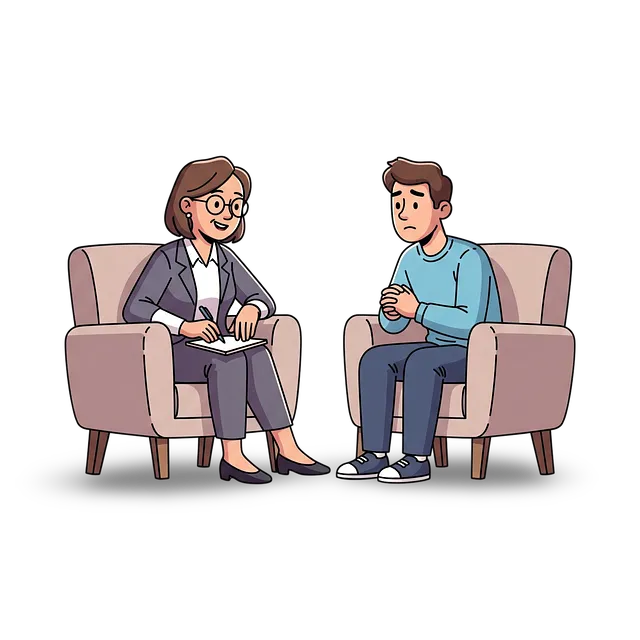Kaiser Mental Health offers specialized therapy for eating disorders like anorexia, bulimia, and binge eating using evidence-based methods such as CBT, family therapy, and couple's counseling. Their holistic approach addresses co-occurring conditions, and they provide tailored treatment plans, inclusive of diverse cultural backgrounds via bilingual services, both in-person and online. Family involvement is key to their process, aiming for long-term management and recovery through comprehensive care.
Eating disorders, including anorexia nervosa, bulimia, and binge eating disorder, are complex conditions requiring specialized care. This comprehensive guide explores various aspects of treating these disorders, emphasizing the critical role of Kaiser Mental Health Therapists in providing effective interventions. From understanding the underlying causes to specialized therapy approaches and creating supportive recovery environments, we delve into strategies that foster positive patient outcomes. Additionally, we discuss the impact of family involvement and long-term management techniques.
- Understanding Eating Disorders: A Comprehensive Overview
- The Role of Kaiser Mental Health Therapists in Treatment
- Specialized Therapy Approaches for Eating Disorders
- Creating a Supportive Environment for Recovery
- Family Involvement and Its Impact on Patient Outcomes
- Long-Term Management and Prevention Strategies
Understanding Eating Disorders: A Comprehensive Overview

Eating disorders are complex mental health conditions characterized by an unhealthy relationship with food and eating. They encompass a range of behaviors, attitudes, and feelings toward food and weight, often leading to significant physical and psychological consequences. The most common types include anorexia nervosa, bulimia nervosa, and binge-eating disorder, each with distinct patterns and symptoms.
At Kaiser Mental Health, our team of specialized therapists is dedicated to providing comprehensive care for individuals struggling with eating disorders. We offer a safe and supportive environment where clients can explore the underlying causes and triggers of their condition. Through evidence-based practices, we tailor treatment plans to meet individual needs, addressing co-occurring issues like depression, anxiety, or trauma, often seen in cases of dual diagnosis. Our private practice therapists employ various therapeutic approaches, including cognitive-behavioral therapy (CBT), family-focused therapy, and couples therapy, ensuring a holistic and effective recovery journey.
The Role of Kaiser Mental Health Therapists in Treatment

When it comes to specialized care for eating disorders, Kaiser Mental Health Therapists play a pivotal role. These professionals are trained to provide evidence-based treatments tailored to address the complex needs of individuals struggling with anorexia nervosa, bulimia nervosa, and other related conditions. By employing advanced therapeutic approaches such as kaiser cognitive behavioral therapy (CBT), these therapists help patients challenge distorted thinking patterns, improve coping mechanisms, and develop healthier relationships with food and their bodies.
In addition to CBT, Kaiser Mental Health Therapists often incorporate innovative techniques like dance therapy programs kaiser. This holistic approach not only supports the mental health of patients but also encourages self-expression and body awareness, fostering a more positive relationship with movement and physical activity. For those seeking specialized care in a private practice setting, kaiser private practice therapists offer discreet and personalized treatment options, ensuring individuals receive the highest level of support tailored to their unique needs and preferences.
Specialized Therapy Approaches for Eating Disorders

Specialized therapy approaches play a pivotal role in effectively treating eating disorders, and Kaiser Mental Health Therapists are at the forefront of these innovative practices. Many individuals struggling with anorexia, bulimia, or binge eating disorder benefit from tailored therapeutic interventions designed to address the complex nature of these conditions. Cognitive Behavioral Therapy (CBT), for instance, is widely recognized as a game-changer in eating disorders treatment. CBT focuses on identifying and changing distorted thinking patterns and behaviors related to food and body image, empowering individuals to develop healthier coping mechanisms.
In cases where eating disorders coexist with other mental health challenges, such as anxiety or depression (dual diagnosis), Kaiser offers comprehensive care. Their therapists employ integrated approaches combining specialized eating disorder treatment with evidence-based therapies for co-occurring conditions. This holistic approach ensures that patients receive targeted support for their specific needs, fostering a more sustainable recovery journey. Additionally, couples therapy kaiser programs are available to address the impact of eating disorders on relationships, providing a supportive environment for partners to understand and navigate these challenges together.
Creating a Supportive Environment for Recovery

Creating a supportive environment is a cornerstone of successful recovery for eating disorders. Kaiser Mental Health therapists play a pivotal role in fostering this by offering a safe, non-judgmental space where individuals can openly discuss their struggles and begin to explore healthier coping mechanisms. Through compassionate listening and evidence-based approaches like cognitive behavioral therapy (CBT), these specialists help patients challenge distorted thinking patterns and develop healthier relationships with food and their bodies.
This supportive setting extends beyond the therapy room, encouraging connections within a wider community of understanding. Kaiser’s trauma-focused counselors integrate this holistic perspective, addressing underlying issues that may contribute to disordered eating. By weaving together individual therapy, group support, and sometimes family involvement, Kaiser Mental Health services create a web of care designed to catch individuals at every stage of their recovery journey, ensuring they have the tools and resilience needed to thrive.
Family Involvement and Its Impact on Patient Outcomes

Family involvement plays a pivotal role in the specialized care of eating disorders. Kaiser mental health therapists often incorporate family therapy as a key component of treatment plans, recognizing that eating disorders rarely exist in isolation. Involving family members allows for a comprehensive understanding of the patient’s environment and support system, which is essential for effective recovery. Research has shown that family therapy through Kaiser can significantly improve patient outcomes, fostering healthier relationships and providing a network of support tailored to the individual’s needs.
Family therapists work with patients and their loved ones to address underlying issues, improve communication, and develop coping strategies. This collaborative approach ensures that patients receive not just specialized care for their eating disorder but also the emotional support necessary to navigate the challenges that often accompany these conditions. For those seeking kaiser therapists near me specializing in eating disorders, finding a supportive family therapy environment can be a game-changer in managing depression and promoting long-term recovery.
Long-Term Management and Prevention Strategies

The long-term management and prevention of eating disorders involve a comprehensive approach that extends beyond immediate treatment. Kaiser mental health therapists play a crucial role in supporting individuals on their journey to recovery, offering strategies tailored to their unique needs. This may include ongoing therapy sessions to address underlying issues, develop healthier coping mechanisms, and prevent relapse. By fostering a supportive environment, these therapists help patients cultivate self-acceptance and body positivity.
Additionally, prevention strategies focus on early intervention and education. Bilingual therapy services, accessible through Kaiser therapists near me or online platforms, can be life-changing for those who struggle with eating disorders. These services cater to diverse communities, ensuring that individuals from various cultural backgrounds receive the specialized care they deserve. Online kaiser therapists provide flexibility, making it easier for folks to access help without geographical barriers.
Eating disorders are complex conditions that require specialized care, and Kaiser Mental Health Therapists play a pivotal role in providing comprehensive treatment. Through a combination of evidence-based therapy approaches, supportive environments, and family involvement, recovery becomes more accessible. Long-term management strategies, including prevention tactics, further emphasize the holistic approach to overcoming eating disorders. By leveraging the expertise of Kaiser therapists and implementing these strategies, individuals can achieve lasting recovery and reclaim their lives.






